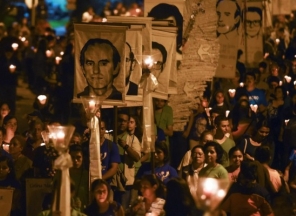
The Due Process of Law Foundation (DPLF), along with the Salvadorian human rights organizations Asociación Pro-Búsqueda de Niñas y Niños Desaparecidos (PRO BUSQUEDA) and Fundación de Estudios para la Aplicación del Derecho (FESPAD), presented an amicus brief before the Salvadorian Supreme Court of Justice in support of the extradition to Spain of four accused in the 1989 Jesuit Killings case.
Those murders shocked the world and the United States, which at the time was supporting El Salvador’s military-backed government in its war against an insurgency. The case was never fully prosecuted in El Salvador because of an amnesty that followed the 1992 peace agreements ending the conflict.
Barred from seeking justice in El Salvador, the families of the victims and human rights groups took their case to Spain, where a universal jurisdiction law allows prosecutions for crimes against humanity committed outside the country. Five of the eight victims were Spanish nationals.
In 2011, Judge Eloy Velasco Nuñez of the Spanish National Court issued an indictment accusing 20 former members of the military, including leaders of the Salvadoran high command in 1989, of planning, ordering, and carrying out the murders. The court issued international arrest warrants as the first step toward extradition.
The government of El Salvador never acted on Judge Velasco’s 2011 arrest warrants, which were reissued in December 2015. Salvadoran officials continued to be reluctant, arguing that there were legal complications.
One of the accused, however, was in the United States, where the Justice Department supported Spain’s extradition request. A federal judge in North Carolina ruled that the defendant, Inocente Orlando Montano Morales, a retired colonel, should be extradited, but this decision has been appealed. Montano had been arrested in 2011, accused of immigration violations.
The advancement of the process in Spain would represent an historic opportunity for justice 27 years after the assassinations, and could impact the national judicial system that for so long has denied justice for cases related to the armed conflict.
The amicus signing organizations argued that the Supreme Court must grant the extradition in order to comply with the international obligations undertaken by El Salvador to prosecute and sanction grave human rights violations and international crimes, as well as interstate cooperation obligations to overcome impunity. Likewise, the Supreme Court needs to take the necessary measures to capture and extradite the remaining accused who have been indicted by the Spanish Court.





